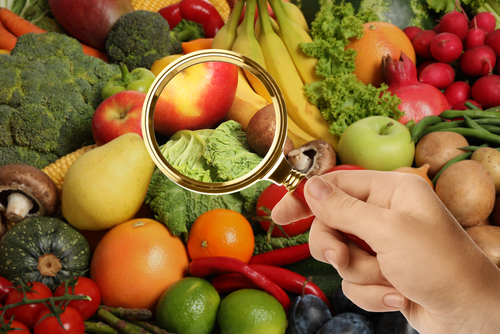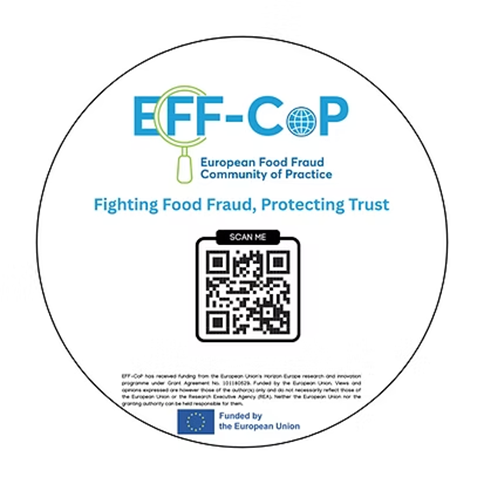Geopolitics of food fraud: how globalisation fuels the counterfeit food trade
Posted: 27 August 2025 | Daniel Davis (Undergraduate student at the George Washington University) | No comments yet
Filippo Grassi, food industry analyst, and Daniel Davis, supply chain specialist, investigate the rising threat of food fraud, from mislabelled produce to meat and seafood scandals. They explore real-world cases, consumer risks, and how traceability, regulation, and technology can protect global supply chains.


From fresh produce to meat and seafood, food fraud is a global problem that can affect any product in the supply chain. Credit: Shutterstock
According to the Joint Research Centre of the European Commission (JRC), in April 2025 there were at least 36 major cases of food fraud worldwide that led to mass seizures, business shutdowns and even arrests. On 06 April 2025, a “significant quantity of untraceable horticulture products” were seized in Catania, Italy, as they were deemed “mislabelled” with the intent to deceive consumers.1 This was not one large producer intending to deceive the masses, but several smaller producers cutting corners to try and get by.
Food fraud isn’t a distant issue — it’s happening right now in markets and restaurants across the world.”
The day after, 07 April 2025, a Chinese restaurant in Madrid, Spain was shut down for serving pigeons that they claimed were duck.2 Upon the restaurant’s closure, its meat storage locker was found to contain defrosted and frozen meats from untraceable origins, including but not limited to sea cucumbers, a prohibited item.2 These untraceable items are able to slip through the cracks owing to the massive web of connections that make up the supply chains.
Recent cases reveal the growing scale of food fraud
These supply chains have evolved into their current forms as a result of mass globalisation. While enabling a plethora of diverse foods to be consumed the world over, it brings significant challenges in terms of traceability, control and sustainability.
For example, globalisation has encouraged the practice of mono-cropping and large-scale farming to keep up with demand. This raises concerns about biodiversity loss, soil degradation and potential overreliance on a few staple crops. While seemingly benefitting small farmers by opening up more markets for their products, it has also created more competition which can lead to malpractice, especially if it lacks the necessary legal and technical tools to guarantee proper food standards. Greater interconnectivity also creates vulnerability against global price fluctuations that would otherwise not affect them. Instability and uncertainty combined with tighter margins to surpass, can influence business owners to act fraudulently. Individual acts by businesses do not exist in a vacuum. Competing on a global scale has become expensive and difficult, so many businesses are cutting corners to keep up. The result is myriad incidents of mass fraud in the food industry.
Globalisation and supply chain complexity
Food Fraud is defined by the UN Food and Agriculture Organization (FAO) as any intentional action taken to deceive customers about the quality, content or nature of food products for financial gain. Fraud can come in many forms, including but not limited to: counterfeiting, mislabelling, tampering, adulterating, and other similar fraudulent activities. Early examples of modern-day food fraud were observed in the US crop industry in the early 2000s. There, around $142 million-worth of sales came from misrepresented grains that were marketed as “organic” despite being nonorganic crops.3 As time went on, more types of food fraud emerged: seafood, meat and poultry, dairy products, herbs and spices, and alcoholic beverages. Adulteration of food can occur by product substitution, unapproved enhancements or additives, counterfeiting, misrepresentation, and many more means. As supply chains grew and demand increased globally, the ability to commit, and demand for, fraud increased.
Globalisation has connected the world and facilitated the exchange of products and ideas between countries, but this large-scale cooperation has also served to increase the complexity of food supply chains. This makes clear observation far more difficult and allows opportunities for food fraud to arise. Rising costs of production combined with higher product demand has incentivised businesses to mislead consumers in any way possible to get ahead. The US Pharmacopeial Convention (USP) estimates that over 10 percent of the global food supply is affected by food fraud every year.4 Mislabelling fraud can lead to allergic reactions for unsuspecting consumers as well as religious markers being falsely reported.
Over 10 percent of the global food supply is affected by fraud every year.”
The 2013 horsemeat scandal perfectly illustrates how gaps are created that allow issues to slip through the net. In Ireland, a meatpacking factory was found marketing ground beef when in reality, 33 percent of the product detected horsemeat, and 85 percent contained pig meat.5 The meatpacking factories claimed this misrepresentation was due to their suppliers from the Netherlands and Spain giving them faulty meat. An outside management consulting firm, KPMG, found over 450 different spots in the supply chain where it was possible for fraud to occur. Businesses are incentivised to cut costs wherever they can to make as much profit as possible and having that much space to bend the rules creates pathways for more food fraud.
The many forms and risks of food fraud
One of the increasing geopolitical pressures that motivates businesses to become fraudulent is tariffs.6 Tariffs are inherently inflationary and raise the costs of goods, which pushes businesses to participate in unsavoury practices. They may encourage supply chains to shift to accommodate a cheaper flow of goods, and this also creates more opportunities for food fraud to occur. Additionally, tariffs can cause companies to source their raw goods provider from under-regulated areas that can compromise the quality of the goods. With a consistent system, there are hundreds of possibilities for fraud to occur, but a changing supply chain creates even more.7
The mass connection between countries has made things like year-round crops possible, but it has also created innumerable opportunities for companies to take advantage of the consumer. Now, more than ever, it is important that people be aware of what they are eating, and support the inquisitive organisations that help keep businesses in order. The US has many government agencies and initiatives to help combat food fraud through regulations, training, food safety culture and other routes. These include, but are not limited to:
- the US Food and Drug Administration (FDA) that deals with recalls, seizures, injunctions, import refusals and import alerts
- the US Department of Agriculture (USDA), specifically its Food and Safety Inspection Service (FSIS) that ensures the safety and integrity of meats, poultry and egg products
- the Center for Disease Control (CDC) that helps monitor and deal with food-related illness after an outbreak occurs.
Towards prevention and traceability solutions
According to the Food Safety Net Services, encouraging whistleblowing can be very helpful, as receiving a “tip” has been one of the most successful ways of catching food fraud in action.8 The EU has legislation in place to help prevent food fraud, but the existence of fraud implies that legislation alone is not enough. Food fraud prevention works best when actors work directly to seek out instances of fraud rather than outlawing it and waiting for someone to slip up or receive a report.
Consumers shouldn’t have to worry about whether the beef they are eating is actually beef.”
Continual international investigations are vital to ensure that no fraud occurs in the hundreds of opportunities at every step of the supply chain. One of if not the biggest issue that causes food fraud is lack of traceability. To create order throughout the food chain, there must be an organisational system that creates clear tracking of all goods. Digital libraries and archives have very good systems that enable exchanges between multiple organisations – much like supply chains, except they don’t struggle with losing where their items are stored. The food system needs an equivalent to the Dewey Decimal System to ensure it knows where all its products are, where they came from, and where they are going. They should also look to implement the use of improved food blockchain technology. This technology helps track all food items and creates transparency, helping businesses stay honest as well as facilitate easier audits and consumer inquiries. Blockchain technology can help to create an archive database that allows for clear traceability and ensures food safety and fair business practices. Consumers shouldn’t have to worry about whether the beef they are eating is actually beef, and businesses should be supported in delivering the highest quality of products, no matter how complex the supply chains are.


Scan the QR code to learn more about the European Food Fraud Community of Practise (EFF-CoP)
It is important that organisations participate in global initiatives to initiate and support these practices. Systemic issues like food fraud cannot be dealt with by only one group; it requires the concerted effort of many individuals united with the aim to resolve them. Each actor or group brings their own unique set of strengths that, when brought together, create a well-rounded and capable team. Forging a strong community is the key to achieving more transparent food supply chains. Networks like the European Food Fraud Community of Practice are working towards connecting these strategies to tackle food fraud and help ensure consumer safety. If one is interested in learning more about this organization, there is information and opportunities to join at https://www.eff-cop.eu/.
References
- Redazione. 2025. Prodotti Ortofrutticoli Non Tracciati: Sequestro E Sanzioni per Oltre 22 Mila Euro – GrandangoloAgrigento. GrandangoloAgrigento. April 6, 2025. https://www.grandangoloagrigento.it/catania/prodotti-ortofrutticoli-non-tracciati-sequestro-e-sanzioni-per-oltre-22-mila-euro.
- Phan Anh. 2025. Spain Restaurant Shut down for Serving Street Pigeons as Chinese ‘Roast Duck’ Delicacy. VnExpress International – Latest News, Business, Travel and Analysis from Vietnam. VnExpress International. April 10, 2025. https://e.vnexpress.net/news/news/spain-restaurant-shut-down-for-serving-street-pigeons-as-chinese-roast-duck-delicacy-4872370.html.
- Spink J, Moyer DC. 2023. Food fraud: causes, consequences, and deterrence strategies. [online] Annual Review of Resource Economics. Available at: https://www.annualreviews.org/content/journals/10.1146/annurev-resource-101422-013027 [Accessed 5 June 2025].
- U.S. Pharmacopeia (USP), 2021. New USP food fraud database helps industry and regulators mitigate risk of food adulteration. [online] Available at: https://www.usp.org/news/new-usp-food-fraud-database-helps-industry-and-regulators-mitigate-risk-food-adulteration [Accessed 5 June 2025].
- The Guardian, 2013. Horsemeat scandal: the essential guide. [online] Available at: https://www.theguardian.com/uk/2013/feb/15/horsemeat-scandal-the-essential-guide#106 [Accessed 5 June 2025].
- Westcott I. 2025. Food Safety Risks amid Trump Tariffs and FDA Cuts: Expert Opinion. New Food. April 10, 2025. https://www.newfoodmagazine.com/article/250212/trump-tariffs-fda-budget-cuts-food-safety-experts-insights/.
- What Tariffs May Mean for Food Fraud: Strategies for Prevention and Detection. 2024. Eurofins Scientific. 2024. https://www.eurofinsus.com/food-testing/resources/what-tariffs-may-mean-for-food-fraud-strategies-for-prevention-and-detection/.
- Food Safety Net Services (FSNS), n.d. What is food fraud? [online] Available at: https://fsns.com/what-is-food-fraud/ [Accessed 5 June 2025].
Bibliography:
European Commission, 2024. Monthly summary of articles on food fraud and adulteration. [pdf] Brussels: Knowledge for Policy. Available at: https://knowledge4policy.ec.europa.eu/sites/default/files/202504.pdf [Accessed 5 June 2025].
Rocchi, B., Romano, D., Sadiddin, A. and Stefani, G., 2020. Assessing the economy‐wide impact of food fraud: a SAM‐based counterfactual approach. Agribusiness, [pdf] Available at: https://flore.unifi.it/retrieve/handle/2158/1183628/469509/Rocchi_et_al-2020-Agribusiness-issue.pdf [Accessed 5 June 2025].
KPMG, n.d. Search results: horsemeat scandal. [online] Available at: https://kpmg.com/it/it/home/misc/search.html?sp_p=any&q=horsemeat%20scandal&sort=_score&page=1&sp_c=9 [Accessed 5 June 2025].
Sawjana. 2023. “The Impact of Globalization on the Food System – Youth in Food Systems.” Youth in Food System. September 13, 2023. https://seeds.ca/schoolfoodgardens/the-impact-of-globalization-on-the-food-system/.
Meet the authors:
Filippo Grassi



Daniel Davis is an undergraduate student at the George Washington University, majoring in political science and minoring in music. His work focuses on policy research, analysis, and recommendations on a range of topics, including education policy and food politics. He finds that the most effective way to gain fresh insight into complex issues is by experiencing them firsthand through travel and exploration. Daniel continues exploring the policies that keep the world running while running around the world.
Related topics
Related organisations
Centers for Disease Control and Prevention (CDC), European Commission, European Food Fraud Community of Practice (EFF-COP), European Union (EU), Food Safety and Inspection Service (FSIS), Food Safety Net Services, Joint Research Centre (JRC), KPMG, UN food and agriculture organization (FAO), US Department of Agriculture (USDA), US Food and Drug Administration (FDA), US Pharmacopeial Convention (USP)
Related regions
Asia Pacific & Oceania, Central and South America, Europe, North America









